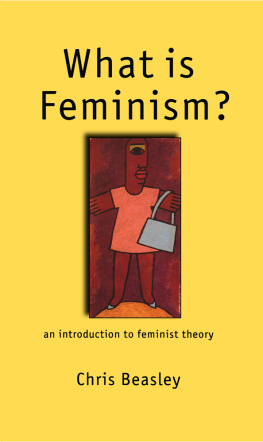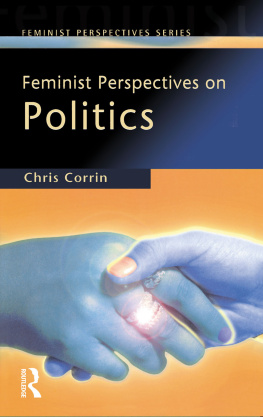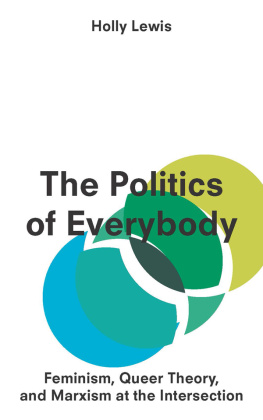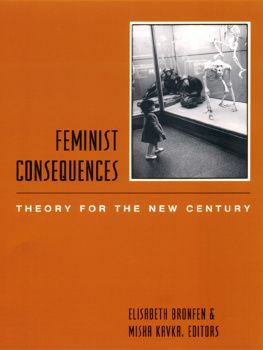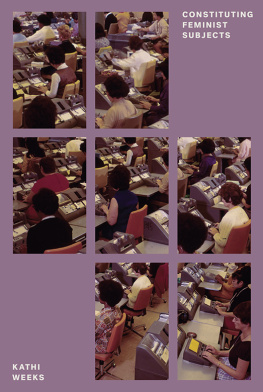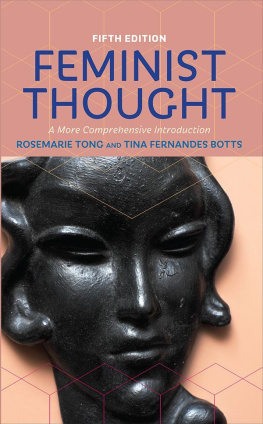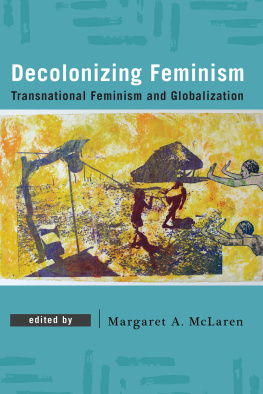ROUTLEDGE LIBRARY EDITIONS:
FEMINIST THEORY
COMING TO TERMS
COMING TO TERMS
Feminism, Theory, Politics
Edited by
ELIZABETH WEED
Volume 3
First published in 1989
This edition first published in 2013
by Routledge
2 Park Square, Milton Park, Abingdon, Oxon, OX14 4RN
Simultaneously published in the USA and Canada
by Routledge
711 Third Avenue, New York, NY 10017
Routledge is an imprint of the Taylor & Francis Group, an informa business
1989 Routledge, Chapman and Hall, Inc.
All rights reserved. No part of this book may be reprinted or reproduced or utilised in any form or by any electronic, mechanical, or other means, now known or hereafter invented, including photocopying and recording, or in any information storage or retrieval system, without permission in writing from the publishers.
Trademark notice: Product or corporate names may be trademarks or registered trademarks, and are used only for identification and explanation without intent to infringe.
British Library Cataloguing in Publication Data
A catalogue record for this book is available from the British Library
ISBN: 978-0-415-53401-7 (Set)
eISBN: 978-0-203-08796-1 (Set)
ISBN: 978-0-415-63521-9 (Volume 3)
eISBN: 978-0-203-09391-7 (Volume 3)
Publisher's Note
The publisher has gone to great lengths to ensure the quality of this reprint but points out that some imperfections in the original copies may be apparent.
Disclaimer
The publisher has made every effort to trace copyright holders and would welcome correspondence from those they have been unable to trace.
COMING
TO
TERMS
COMING
TO
TERMS
Feminism,
Theory,
Politics
EDITED BY ELIZABETH MEED
Published in 1989 by
Routledge
An imprint of Routledge, Chapman and Hall, Inc.
29 West 35 Street
New York, NY 10001
Published in Great Britain by
Roudedge
11 New Fetter Lane
London EC4P 4EE
Copyright 1989 by Roudedge, Chapman and Hall, Inc.
Printed in the United States of America
All rights reserved. No part of this book may be reprinted or reproduced or utilized in any form or by any electronic, mechanical or other means, now known or hereafter invented, including photocopying and recording, or in any information storage or retrieval system, without permission in writing from the publishers.
Library of Congress Cataloging in Publication Data
Coming to terms : feminism, theory, politics / edited by Elizabeth
Weed.
p. cm.
Bibliography: p.
Includes index.
ISBN 0-415-90067-0; ISBN 0-415-90068-9 (pbk.)
1. Feminism-Philosophy. 2. Feminist criticism. 3. Identify.
I. Weed, Elizabeth. 1940
HQ1154.0644 1989
305.4201dc19 89-6021
CIP
British Library Cataloguing in Publication Data
Coming to terms: feminism, theory, politics
1. Society. Role of women. Role of women
in society. Feminist theories
I. Weed, Elizabeth II. Pembroke Center
for Teaching and Research on Women
305.4201
ISBN 0-415-90067-0
ISBN 0-415-90068-9 Pbk
Contents
Acknowledgments
The essays in this volume address some of the most insistent questions raised by the Pembroke Center's ongoing research project on Cultural Constructions of Gender. What successes the Center has had in focussing collaborative attention on such questions are due in great measure to Joan Wallach Scott's leadership as the Pembroke Center's founding director (198185). Joan Scott's brilliant contributions to the field of history are matched by her innovative institutional achievements, and Brown University, the Pembroke Center for Teaching and Research on Women, and feminist inquiry in general are the beneficiaries of her work. It has been my personal good fortune to benefit, as a friend and colleague, from Joan's powerful intelligence and extraordinary generosity, for which I thank her.
Many helped with this collection. Special thanks go to Karen Newman, present director of the Pembroke Center, for her support; to Barbara Anton for her unfailing help; and to Elizabeth Barboza who, as coordinating secretary, makes everything possible. A warm thanks to Miven Booth, Michele Burke, Nicole Cunningham, Colette Matzzie, Melissa Murphy, and Phyllis Oscar, who helped at various stages of the project, and to Erika Rundle and Carol Irving for their proofreading. I am most grateful to Christina Crosby for her advice throughout, and to Barbara Babcock, Karen Newman, Joan Scott, Naomi Schor, and Ellen Rooney for their helpful comments on the introduction. My sincere gratitude, finally, to the contributors to this volume for their patience, generosity, and good humor.
The Pembroke Center is endebted, for its research projects, to the Ford Foundation, the National Endowment for the Humanities, and Brown University, none of which is responsible for the wide range of opinions expressed in this volume, but all of which are to be credited for their strong support of collaborative feminist scholarship.
I wish to acknowledge permission to reprint essays from the following sources: Changing the Subject, in Feminist Studies, Cultural Studies, ed. Teresa de Lauretis (Bloomington: Indiana University Press, 1986), and in Nancy K. Miller, Subject to Change (New York: Columbia University Press, 1988); Julia Kristeva: Take Two in Jacqueline Rose, Sexuality in the Field of Vision (London: Verso, 1986); Dreaming Dissymmetry: Barthes, Foucault, and Sexual Difference, in Men In Feminism, eds. Alice A. Jardine and Paul Smith (New York: Methuen, 1987); Gender: A Useful Category of Historical Analysis, in American Historical Review, vol. 91, no. 5 (December 1986), and in Joan Wallach Scott, Gender and the Politics of History (New York: Columbia University Press, 1988); and A Manifesto for Cyborgs: Science, Technology, and Socialist Feminism in the 1980s, Socialist Review, no. 80 (March-April 1985).
Introduction: Terms of Reference
There is no academic field in which debates around theory, politics, and the production of knowledge are more animated than in feminist studies. The enormous development of feminist scholarship across the disciplines in the last two decades has had its institutional effects, not the least of which have been widely publicized debates on the role of the humanities and Western civilization in the university. Feminism figures prominently in current questions about theory and the constitution of knowledge, and indeed many of the issues raised are related in some way to the inescapable impact on the academy of feminism's transformation of knowledge. Moreover, the political interests of feminism are wide ranging, joining the academic and political in ways that extend from the study of structures of domination in representations of gender, to the examination of problems of reproductive technologies, to the study of the position of third world women in international development and multinational expansion.


